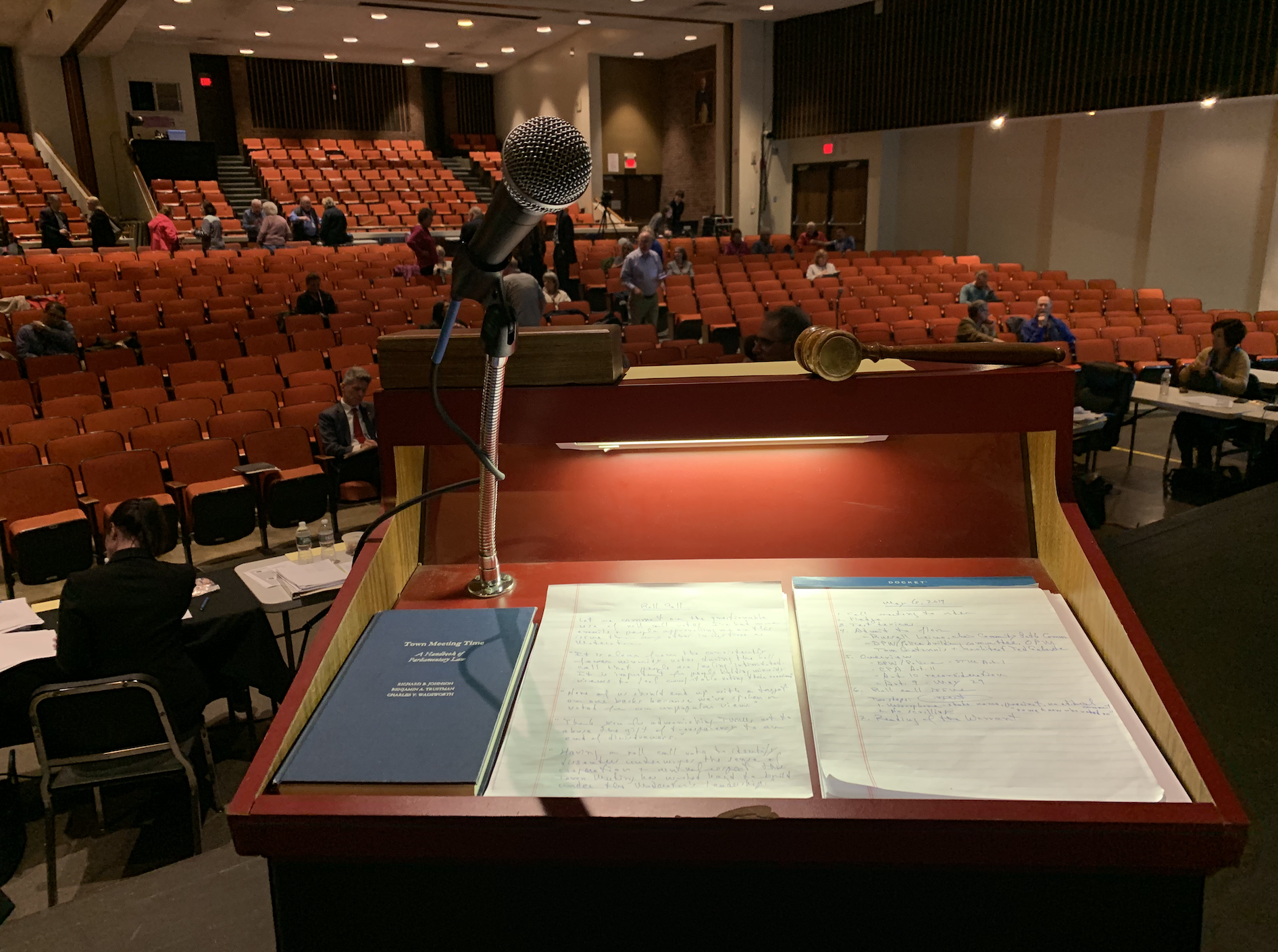Photo: The view from the moderator’s stand.
If the second time is “lucky” and a third “the charm,” what’s the idiom for a fourth vote on the same article at Town Meeting?
Whatever word you want to use, the marathon debate around a seeming inconsequential request to increase the term of the Town Moderator from one to three years ended a few minutes before 11 p.m. when Town Meeting defeated the article for the third time in four tries by a healthy margin on Monday, May 6
The debate Monday from a town government’s perspective is whether lengthening the term “would create a more effective way for town government [to be run],” said Mark Paolillo, who stepped into the moderator’s chair when Widmer recused himself from the position.
Speaking before the body, Widmer repeated his comments from last week his reasons for bringing forth the article; principally a yes vote would bring the moderator’s position in sync with the three-year terms of other town offices (such as treasurer and town clerk) and town meeting. Today, about half of the communities in Massachusetts have moderators serving three years.
Widmer also commented on the moderator position in town government as a number of members after the first votes on the article felt they knew little of the power it wields.
The most significant role the moderator plays is selecting members of 4 – the warrant, capital budget, permanent building advisory, and bylaw review – of the 30 permanent town committees as well as the numerous building committees in town, said Widmer, who noted this function secures a separation of powers between the Town Meeting and town government.
“All of these are legislative committees and I appoint these … on your behalf,” said Widmer, noting this prevents the town’s administration from having undue influence over the committees.
When appointing the committee members, Widmer said he goes through a comprehensive “checks and balances” process – including asking for volunteers, takings recommendations, speaking to the boards and conducting interviews – “that serves Town Meeting and the town.”
“My hope is simply that ultimately [the discussion] results in an informed discussion and debate,” said Widmer.
The theme whether the moderator has too much power as to trust that it would not be abused by a future office holder.
Elizabeth Dionne, Pct. 2, a member of the Warrant Committee who was selected to the board by Widmer, pointed out “the Board of Selectmen actually does have real power. If we are comfortable with three-year terms for the Board … we should be comfortable with a three-year term for the moderator who has far less power.”
Claus Becker, Pct. 5, said there is an assumption by supporters of the three-year term that the moderator will be a rational person when many examples of leaders on the “national scene” provide examples of those who are willing to “set things on fire and let them burn.” The 50 signature floor to get on the ballot is not a stumbling block for nearly anyone who is willing to take on the position.
Anne Marie Mahoney, Pct. 1, who has been a member of several committees over the years, said a moderator’s appointment to the Capital Budget Committee which she chair’s “will never control [it]” since he has only three selections to the seven-member board. But those three moderator appointees “are the check and balances” to the other members who come from the administrative side of town government.”
“A one-year moderator potentially could appoint many ill-suited folks to these committees and be gone in a year with very little accountability. A three-year moderator has to take the responsibility and the heat for at least three years in his or her appointment,” said Mahoney, who said a vote for a
Alex van Geel, Pct. 7, said committees and boards with multiple members have the ability to check the actions of “that worse person” in the group, which is unavailable when discussing an individual with legislative powers on a single person body.
When the (third) vote on the article is taken, it went down to








Leave a Review or Comment